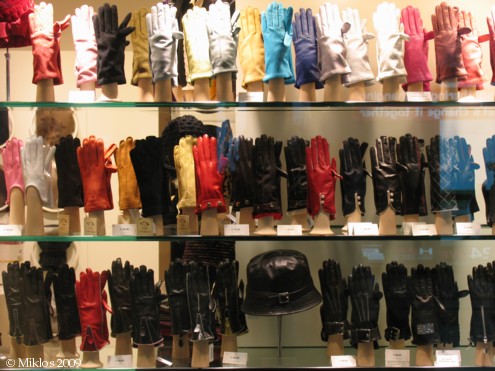A brief history of the glove

Glove store, Fiumicino airport (Rome)
«The old proverb goes, that for a glove to be well made, three nations must have a hand in it: Spain must dress the leather, France cut the shape, and England sew the seams. At the present time, France has the monopoly, at least in reputation; for not even the best Spanish kid would be preferred to the rat-skins of Paris, nor can the stoutest English sewing compete for favour—we will not speak of excellence— with those slender, easily loosened stitches of French needles, so sure to give way at the ball of the thumb, and in the three-cornered joinings of the fingers. Though, indeed, the French glove sewers use a machine invented by an Englishman, which should secure the wearer against all such mishaps as flying ends and ripped seams; only it does not. But for all their shortcomings, French gloves are unapproachable, even in these days of general commerce and awakened wits, when everybody imitates everybody, and there is no special art left to any one; and neither Cordova nor Dent can give us such well-cut, well-fitting, well-looking, and desirable “hand shoes,” as those delicately tinted marvels to be found on the Boulevards of the Circe of modern cities. . . .
Gloves are very different now to what they used to be, say in Queen Elizabeth’s time, when they were perfumed—then called Frangipanni gloves, from the Italian marquis of the same name, who first invented that delicate art, as well as the special perfume employed; but later the scent was called here the Earl of Oxford’s perfume, from its English chaperon and introducer. . . .
Those » sweete gloves » were dangerous sometimes. At a time when poisons were so subtle that they could be conveyed in any medium whatsoever—food or clothing indiscriminately— and when gifts of gloves, perfumed delicately, were common among friends—and enemies— sweet-scented hand shoes were as fit instruments of death as anything else; and, unless history belies her, Catherine de Mediéis knew the value of them on more than one occasion. . . .
Gloves were greatly favoured as special presents on New Year’s-day and other solemn occasions of gift-making. By degrees the fashion died out, having first passed through the phases of a glove full of money; then of “glove money” without the glove; until glove- money was a tax long after the meaning of the name had died out, and people had forgotten why it was given or expected. It. was not thought indecorous to present New Year’s-day gloves even to judges, though they might not be worn; at least not in court, where it was de rigueur that a judge appeared bare handed. Was there suspicion of the itching palm beneath salved over with a silver plaister? . . .
Long before our time gloves were worn, and held to be symbolic too. Xenophon speaks of the Persians as effeminate for clothing their head, their feet, and their hands with thick gloves against the cold. Homer speaks of Laertes in his garden, with gardener’s gloves to keep him from the thorns; and another poet, Varro the Roman, says that olives gathered by the naked hand are better than those plucked with gloves. The Chinese think differently about their tea. Athenseus, in his Deipnosophists, sneaks of a glutton who went to table with his gloves on, that he might eat his meat hotter than the rest, and so get a greater share; and Musonius, a philosopher, who lived at the close of the first Christian century, among other invectives against the corruption of the age—that poor age which is always so much more corrupt than its predecessors!—says: “It is shameful that persons in perfect health should clothe their hands and feet with soft hairy coverings.” All of which collection of erudite lore may be found iu Disraeli’s Curiosities of Literature—itself the greatest curiosity. . . .
The Jews knew the value of these hand coverings. That expression in the Psalms, “Over Edom will I cast out my shoe,” is said, in the version known to scholars as the Chaldee Paraphrase, to mean: “Over Edom will I cast out my glove”—I will take possession, I will assert my right, and challenge its denial: throwing the glove being an Eastern manner of taking possession. Also in Ruth, when it says, “Now this was the manner in former time in Israel concerning redeeming and concerning changing, for to confirm in all things; a man plucked off his shoe, and gave it to his neighbour: and this was a testimony in Israel”—it was his glove that he plucked off: his glove which Boaz withdrew when he bought the land of Naomi’s kinsman, and which he gave up as the symbol of taking possession. So, Saul, after his victory over the Amalekites, set up a hand as the token of his victory; and many Phœnician monuments have an arm and a hand held up as a sign of supremacy and power. The custom of blessing gloves at the coronation of the kings of France is a remnant of this old Eastern habit — a glove, indeed, meaning to them investiture. . . .
But gloves are also used as symbols of quarrel as well as of possession, and to throw down the gauntlet has always meant to challenge, to assume the right to defend, both in chivalrous times, and before and after. . . .
The perfection of a modern glove is its smoothness and elasticity, its unexceptionable fit, the delicacy and uniformity of its lint, and a sewing that shall be at once fine and strong: while anything like embroidery or adventitious ornament, or mixture of colours, or incongruous materials, does not count as the best taste in these modern days of luxury and utility combined. But in olden times gloves were often exceedingly costly. That story of Cœur de Lion being discovered on his fateful journey by the jewelled gloves which hung at his page’s girdle, shows how magnificently they were sometimes adorned; while even Holy Mother Church did not disdain the use of these mundane vanities for her reverend hands, the gloves of all the prelates of England being bedecked with precious stones as parts of ordinary prelatical pomp and useful glory. . . .
But the history of gloves and glove-making,» is, like all things whatever in human life and society— a very interesting matter when looked into and thoroughly traced from source to outfall; a thoroughness to which this mere surface sketch has no pretension.
“Gloves”, in All the year round, A Weekly Journal conducted by Charles Dickens, n° 218 (Saturday, June 27, 1863). London.

[...] appeared in the guise of a comment to my Brief history of the glove, and consisted of a promotional message for a group of companies specializing in all kinds of [...]
Ping par Miklos » Words to avoid in your blog so as not be treated like s**t by this Pakistani company — 26 août 2009 @ 19:29